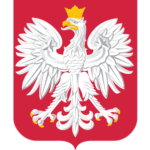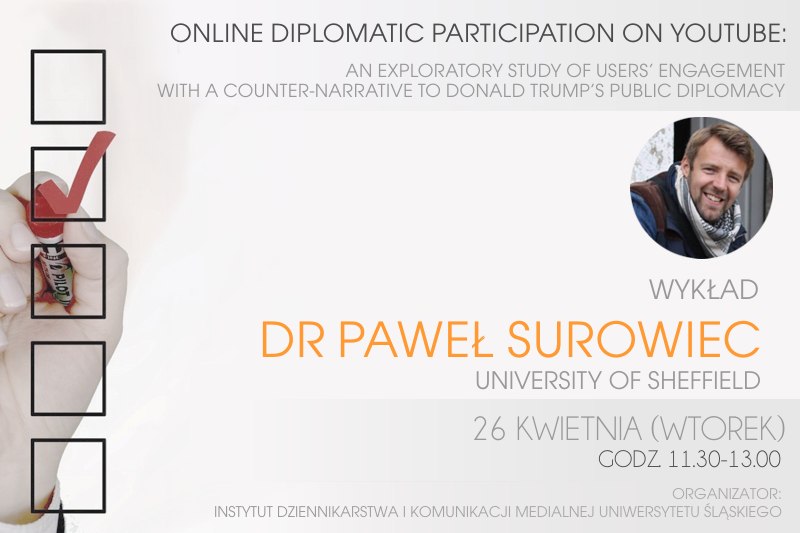Instytut Dziennikarstwa i Komunikacji Medialnej UŚ serdecznie zaprasza do udziału w interesującym spotkaniu na temat dyplomacji publicznej oraz kontrnarracji użytkowników sieci – wykładzie
dr. Pawła Surowca
The University of Sheffield
Online Diplomatic Participation on YouTube: An Exploratory Study of Users’ Engagement with a Counter-Narrative to Donald Trump’s Public Diplomacy
26 kwietnia (wtorek) godz. 11.30-13.00
Wydarzenie w języku angielskim odbędzie się zdalnie 26 kwietnia 2022 roku w godzinach od 11.30 do 13.00 na platformie Zoom pod adresem:
https://zoom.us/j/99628532872?pwd=SVYzQVJiTW9BYlFFNm5nREdERUloUT09
O prelegencie
Dr Paweł Surowiec, jest starszym wykładowcą na Uniwersytecie w Sheffield w Wielkiej Brytanii. Specjalizuje się w komunikacji strategicznej, dyplomacji publicznej i kampaniach politycznych w kontekście polityki europejskiej. Jest autorem monografii Nation Branding, Public Relations and Soft Power: Corporatising Poland (Routledge, 2017) oraz współautorem publikacji Social Media and Politics in Central and Eastern Europe (Routledge, 2018) i Public Diplomacy and the Politics of Uncertainty (Palgrave 2021).
O wystąpieniu
Webinarium poświęcone jest najnowszym wynikom badań opublikowanych wspólnie przez autorów: Paweł Surowiec (University of Sheffield), Christopher Miles (Bournemouth University), Jaromír Mazák (Charles University) i Grzegorz Kapuściński (Oxford Brookes University)
Abstract artykułu związanego z prelekcją
The paper explores public engagement on the YouTube platform with a campaign that sought to counter the ‘America First’ foreign policy orientation narrative delivered by Donald Trump’s inaugural public diplomacy. Developing the debate on the role of social media in public diplomacy, we study the hybrid media activists’ campaign, ‘Every Second Counts’, inspired by the Dutch late-night show, ‘Zondag Met Lubach’, in order to refine the conceptualisation of online diplomatic participation. The authors follow an exploratory design mixing qualitative and quantitative content analyses. By drawing on samples of the campaign’s YouTube videos (n=50) and users’ comments (n=9,922), they examine engagement using measures of popularity, interactivity and tonality. The results of a qualitative content analysis reveal satire as a strategically deployed genre operating as an affective resource that marshals tactics of disparagement, intertextuality, tonality, scripts, and tropes. Quantitative analysis reveals significance among explanatory variables, but overall the study finds that the repertoire of soft power resources featuring in the counter-narrative is not a strong set of predictors of YouTube users’ engagement with the content of this transnational campaign.






